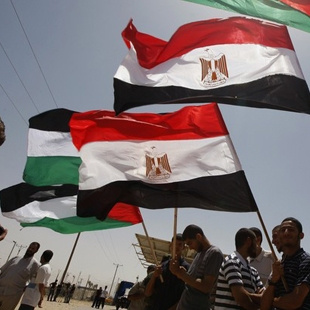Iran Is Not Egypt’s Priority

 Egypt opened the Rafah Crossing for Gaza Palestinians, opening their way to the outside world after four years. This happened 10 days after the breakthrough agreement between Fatah and Hamas in Cairo. The impact of Egypt’s critical decision on regional affairs is discussed in Iranian Diplomacy’s interview with Sabah Zanganeh, Middle East expert:
Egypt opened the Rafah Crossing for Gaza Palestinians, opening their way to the outside world after four years. This happened 10 days after the breakthrough agreement between Fatah and Hamas in Cairo. The impact of Egypt’s critical decision on regional affairs is discussed in Iranian Diplomacy’s interview with Sabah Zanganeh, Middle East expert:
IRD: Mr. Zanganeh, how important do you think is the reopening of the Rafah Crossing between Egypt and Gaza?
SZ: I think it has both symbolic and practical impacts. Symbolically, it rids Egypt from one-sided commitments to Israel and gives it the opportunity to mend fences with Arab neighbors, and act according to its national interests. On the other hand, it has implications in practice. Egypt has no obligation to undertake the burden of safeguarding Israel’s borders anymore.
IRD: How is the decision important for the Palestinians?
SZ: This is a positive turn for the Palestinians. They have religious and historical commonalities with Egypt as their close neighbor, and normalization of ties with this Arab country will remove a great deal of pressure. Medicine and food will be more accessible to Palestinians and the Palestinian officials will have less trouble in their foreign visits.
IRD: How suggestive of Egypt’s foreign policy could the reopening be?
SZ: This is the first step at a no-return path in my opinion. It was what many in the region expected from Egypt. I think the popular pressure and citizens’ active presence in politics will force the Egyptian rulers to continue this trend.
IRD: Will relations with Palestine be Egypt’s foreign policy priority?
SZ: Think of three concentric circles. The first one is relations with Palestine, the second is relations with the Arab world, and the third is relations with the Muslim World. Palestine stands at the core of these three domains. The relations between Egypt and Palestine are intensely close and interdependent. Neither Egypt is ready to let Palestine go, nor can Palestine survive without Egypt’s support.
IRD: Should we anticipate a similar scenario for Cairo-Tehran relations?
SZ: I think we should consider the priorities of Egypt in the new era. Rebuilding ties with close neighbors such as Palestine, Libya and Sudan is their priority. Other circles need more time. I think reconciliation with Iran is a second-tier objective for the Egyptians.
IRD: During the recent days we have seen expressed interests in relations with Iran by Egyptian officials and in the meantime, the detention of an Iranian diplomat in this country. How should we explain this paradox?
SZ: Reconciliation between Iran and Egypt empowers both countries regionally. So the detention of the diplomat could be a diversionary move by countries suffering close relations between two regional powerhouses. I don’t think it stems from domestic differences either.

